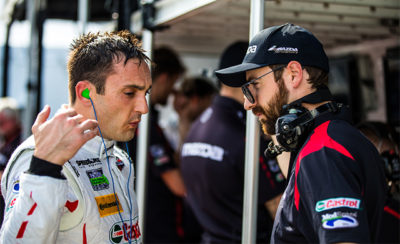Part 2: As important as it is to find a coach, it’s just as critical to be a good student.
In the first installment of this story, we explored reasons why you might want to find a driving coach, and what qualities you should seek in one. In order to get the most out of a coaching session, though, you need to be the best study you can. Toward that end, communication is essential.
“First off, you talk about your goals,” says Tom Long, pro coach and driver. “That’s the most important thing, so you as a client can understand exactly what you’re looking for so you can measure your success. It helps the coach understand what the client is looking for to try to help them achieve those goals.”
Another part of communication is feedback and asking questions to ensure you understand the instruction. “Make sure it’s a conversation, that as the driver you are stopping, asking questions, and understand what it is you’re trying to ascertain, rather than just nodding your head and then you get in the car and realize, ‘Oh, I don’t know exactly what he meant by that,’” he adds.
Long also warns of a common pitfall suffered by coaching students. He’s emphatic that you don’t need to impress your coach. “You don’t want to drive differently than you normally would,” he insists. “Act yourself, so to speak. If you’re doing something differently than you normally do, you’re not getting the information of the coaching that applies to what you do. It is very common to overdrive or try to make an impression, or perhaps just because you have that nervousness from someone watching your moves.”
Another component of coaching is “when.” If you have the option of getting advice on a test day or a race weekend, there are good reasons to choose either, says Andrew Carbonell, driving coach and pro driver, although he leans toward the less-pressure situation.
“Either way you are going to make gains,” he says. “I believe test days are good because there is less pressure. As we all know, racing is a very mental sport; it’s a sport that can get in your head, and if you’re not all there and totally in control of your thoughts and emotions, you’re not going to perform at a high level. Many times, there’s added pressure of the expectations of where you need to qualify, [and] where should I finish? Let’s forget about all of that – that will come if we fix what we’re working on.”
If you can put the pressure out of your head on a race weekend, then that’s as good a time as any to get some coaching. “Don’t think about a lap time you have to make, or a finishing position. Think about yourself, your driving, what is going on when you’re in the car. Apply the techniques that we’re trying to implement. Drivers get caught up in the surrounding environment. As long as you perfect your craft, that surrounding environment is irrelevant – you will finish well,” he says.
The last question to settle is where. You may not have your choice of tracks, but it’s a good idea that it be one the coach is familiar with. But the great thing about modern technology is that your coach doesn’t have to be on site for you to get results. With data, the internet and cell phones, it’s very possible to get some quality instruction even if your coach is racing on the other side of the country.
“A data file is helpful, but it could also be a video,” says Long, who adds that both is best. “You can absolutely effectively coach by that, and I know many coaches who do. They set up an online meeting so that they are both there. If you’re at a track with limited internet, you could have a phone call with some of the highlights, or even an e-mail with some things to focus on for the next session or the next day.”
The reality is that coaching can often be done in any setting, anywhere, as long as the lines of communication are open. An on-site coach at a private test day may be the best option, but it’s far from the only one, so the excuses for not having a coach to get a driver over a hurdle are rapidly shrinking.
Andrew Carbonell, based in Miami, FL
Made a career as one of the top Mazda MX-5 racers in the world. Carbonell helped develop the MX-5 Cup car, and been a championship contender in the IMSA Continental Tires SportsCar Challenge.
Tom Long, based near Charlotte, North Carolina
www.tomlongracing.com
Helped develop the Mazda MX-5 Cup car, and is very active as a driver coach. A former MX-5 Cup champion, Long moved through the Mazda grassroots sports car program to reach the Prototype team in 2014.
Joel Miller, based in San Diego, CA
joel-miller.squarespace.com
Has a degree in mechanical engineering, was the featured presenter in the national-touring Mazda STEM (Science, Technology, Engineering, Math) education program R.A.C.E. (Racing Accelerates Creative Education), was the official driver coach and mentor for the Mazda Road to Indy program, and raced the No. 70 Mazda RT24-P Mazda Prototype.


 ACCESSIBILITY
ACCESSIBILITY